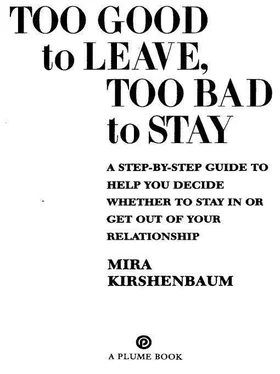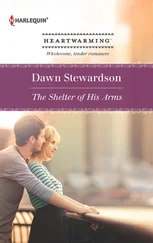Kirshenbaum, Mira - Too Good to Leave, Too Bad to Stay
Здесь есть возможность читать онлайн «Kirshenbaum, Mira - Too Good to Leave, Too Bad to Stay» весь текст электронной книги совершенно бесплатно (целиком полную версию без сокращений). В некоторых случаях можно слушать аудио, скачать через торрент в формате fb2 и присутствует краткое содержание. Жанр: Психология. Описание произведения, (предисловие) а так же отзывы посетителей доступны на портале библиотеки ЛибКат.
- Название:Too Good to Leave, Too Bad to Stay
- Автор:
- Жанр:
- Год:неизвестен
- ISBN:нет данных
- Рейтинг книги:3 / 5. Голосов: 1
-
Избранное:Добавить в избранное
- Отзывы:
-
Ваша оценка:
- 60
- 1
- 2
- 3
- 4
- 5
Too Good to Leave, Too Bad to Stay: краткое содержание, описание и аннотация
Предлагаем к чтению аннотацию, описание, краткое содержание или предисловие (зависит от того, что написал сам автор книги «Too Good to Leave, Too Bad to Stay»). Если вы не нашли необходимую информацию о книге — напишите в комментариях, мы постараемся отыскать её.
Too Good to Leave, Too Bad to Stay — читать онлайн бесплатно полную книгу (весь текст) целиком
Ниже представлен текст книги, разбитый по страницам. Система сохранения места последней прочитанной страницы, позволяет с удобством читать онлайн бесплатно книгу «Too Good to Leave, Too Bad to Stay», без необходимости каждый раз заново искать на чём Вы остановились. Поставьте закладку, и сможете в любой момент перейти на страницу, на которой закончили чтение.
Интервал:
Закладка:
• After the first year. It’s a good sign when there are periods as long as two or three months in which your relationship is on its old footing, combined with periods equally as long when the “crime” isn’t foreground. The mention of people, places, and events associated with the “crime” is less upsetting. You can listen to your partner’s explanation of what the crime meant to him without getting very upset. You can talk about what happened without feeling the same degree of pain you first felt and without spiraling into hurt and anger.
• After the first five years. It’s a good sign if you’ve arrived at some sense of exactly where your relationship was damaged and if it seems as though this specific damage is significantly healing; if you don’t avoid talking about what happened but actually bring it up; if the issue of trust and what’s needed to rebuild it has been brought out into the open and you’re making progress toward regaining trust.
By the time five years are up, you should be able to formulate what you learned from your mistakes and what you can do to prevent them in the future. Each person should be able to take responsibility for what he did without there being a sense of blame. The two of you should be able to start feeling good about yourselves as a couple in spite of what happened.
This framework is rough. Individuals will vary. A happy-go-lucky person with a generally positive outlook might heal faster. Someone who’d suffered a number of personal disasters or losses in the past might heal much more slowly. The point, though, is to look for some healing overall, as measured by
• A less painful wound between you in the short run
• A resumption of ordinary relationship activities in the medium run
• The ability for both of you to deal productively and nonavoidantly with the wound and what caused it in the long run
Guideline #28 is important because people often don’t even know how to begin to think about what a “crime” really means to their relationship. But merely because something bad happened is not a sign that the relationship is too bad to stay in. If you can see that healing is happening, then you can feel comfortable knowing that you’re going through a healing process and that you’ll survive the wound intact.
STEP #29: Is FORGIVENESS POSSIBLE?
But what does it mean if your answer to question #28 was no; if, depending on where you are in the timetable, there’s been no healing yet? That’s important, but all by itself it doesn’t tell you if you’ll be happier if you leave. It’s true that healing hasn’t happened yet. But the question now is whether the two of you have the capacity to heal a wound like yours.
And that depends on your answer to the following question:
Diagnostic question #29. Is there a demonstrated capacity and mechanism for genuine forgiveness in your relationship?
What I’m asking is whether the person who’s been injured has actually ever forgiven her partner for anything. After a period of hurt and anger, did she actually let go of her sense of grievance? Was the forgiveness genuine, and not merely words? And, equally important, did the other partner, the one who needed the forgiveness, willingly perform any act of restitution or atonement or healing? And did this act make a difference?
Genuine forgiveness is both a psychological capacity and an interpersonal talent. You have it in you to give and you know how to give it. It’s also a mechanism that some relationships have, just the way some relationships have a mechanism for preparing a party without having a fight. If there is this possibility of genuine forgiveness, then wounds can heal.
The Ingredients for Forgiveness
When I’ve seen people forgive each other through the years, even for inflicting the deepest wounds, I keep seeing three ingredients for forgiveness. As long as you have these three, the capacity for healing is there.
First, and most basically, the aggrieved person simply reaches the point where she doesn’t need to hold on to her bitterness and hurt and fear and loss. You can’t forgive your partner when you’re more emotionally invested in holding on to your feeling devastated and beating your partner over the head with it.
Second, the aggrieved person actually has forgiven her partner for things in the past. If you’re in a relationship with someone who’s always held on to every other grievance, however minor, why would she not hold on to this one? If your partner’s only rarely and only reluctantly and only slightly forgiven you when you’ve apologized in the past, why would she forgive you now? But if you actually felt forgiven for hurts you inflicted in the past, then the capacity for forgiveness has been demonstrated and you can be forgiven again. Yet the possibility of forgiveness between you and your partner doesn’t only depend on whichever one of you needs to do the forgiving.
So, third, forgiveness is made possible if the other person’s genuinely sorry for what he did. It’s not just a matter of words. You’ve got to feel that he truly is remorseful and isn’t just sick and tired of your being pissed off at him. One way you can test for the difference between genuine sorrow and phony get-off-my-back sorrow is if you see that your partner really feels the true impact of what he did. He sees exactly how and why you were hurt. He appreciates how and why he’d be hurt if you’d done the same thing to him.
You’ll know it’s genuine sorrow only if the partner who committed the injury does something concrete to re-balance things. The fact is that if you’ve suffered a hurt, you’ve suffered a loss. In the law they talk about being made whole again. That can’t happen in a relationship, but something like it can come close to happening. I’ve seen people say something like, “Look, you suffered that, so I’ll suffer this,” or “Look, you lost that, so I’ll give you this instead.” It’s why people who screw up buy their partners flowers. But it’s got to be a real act, not an empty, mechanical gesture.
Here then is the guideline:
GUIDELINE #29
If there’s a demonstrated capacity for genuine forgiveness, including the ability to let go of anger and hurt, the ability to feel forgiveness, and the ability in the other person to show that he feels sincerely sorry, then this relationship can survive an injury that would otherwise make it too bad to stay in.
But if not, and, based on guideline #28, if there’s also been no healing over time, then the damage was probably so great and the capacity for healing is so small that this relationship is too bad to stay in. In such a case, most people are happy they left and unhappy they stayed. Quick take: If you can’t find your way back to forgiveness, you can’t find your way back to each other.
The key to this entire issue is signs that natural healing is happening. Some hurts are deep and permanent. And if there’s no change over time and no forgiveness, then the relationship is a corpse. But improvements over time and the slow but awesome power of forgiveness are the keys to signs of healing. As long as healing is happening, it’s a mistake to give up on a relationship just because there’s been damage.
16
I Can’t Get No Satisfaction
Issue: Getting Your Needs Met
How many needs have to go unmet before it makes sense to leave? How much bitter struggle do you have to put up with to get your needs met before it makes sense to leave? That’s what we’ll deal with here.
WELCOME HOME
A relationship is supposed to be a kind of home within the home, an inner sanctum, a refuge. It’s supposed to be the unique place where you and that one special person can find peace and get the things you really want in life that mean the most to you—that’s the vision of a relationship we look forward to when we fall in love.
Читать дальшеИнтервал:
Закладка:
Похожие книги на «Too Good to Leave, Too Bad to Stay»
Представляем Вашему вниманию похожие книги на «Too Good to Leave, Too Bad to Stay» списком для выбора. Мы отобрали схожую по названию и смыслу литературу в надежде предоставить читателям больше вариантов отыскать новые, интересные, ещё непрочитанные произведения.
Обсуждение, отзывы о книге «Too Good to Leave, Too Bad to Stay» и просто собственные мнения читателей. Оставьте ваши комментарии, напишите, что Вы думаете о произведении, его смысле или главных героях. Укажите что конкретно понравилось, а что нет, и почему Вы так считаете.












